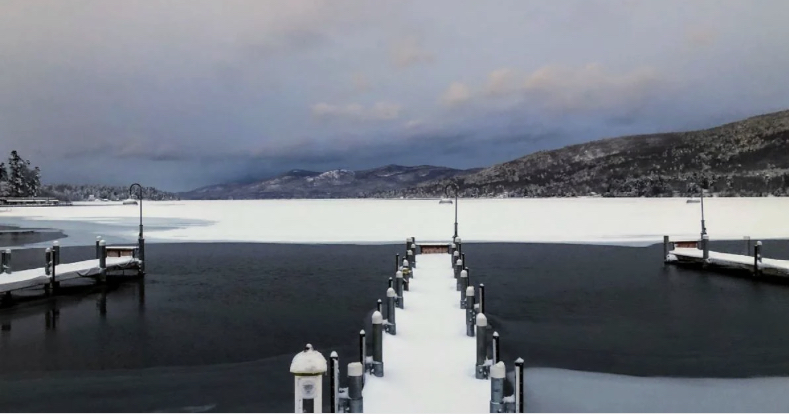As the Winter Carries On, Will Lake George Freeze Over?
The answer… Probably!
Statistically, the lake freezes over 90% of the time; on average, the lake is considered frozen by January 19th. The term used when the lake is frozen is “ice-in” and when the lake is no longer considered frozen, it’s known as “ice-out”.
Lake water freezes as the air temperature drops in late summer… The temperature of the top layer of the lake drops, and the cooling surface water becomes heavier and denser, reaching a point where it drops to the bottom of the lake, and forces warmer, less dense water up to the surface. The process of upper layer cooling and sinking continues to occur until all of the water in the lake drops to approximately 39 degrees Fahrenheit, at which point the lake water will have reached its maximum density.
However, lakes tend not to freeze over completely, because the top layer of ice and snow act as an insulator. Due to this insulating layer, fish and aquatic plants can survive under the ice during the winter months… Fish are cold-blooded, meaning that their body temperature matches the environment. The colder temperatures slow down their metabolism, and as a result, many fish can survive through the winter…
… So long as the water is oxygenated. When the ice forms across the surface of the lake, it seals off the water from atmospheric oxygen and blocks out much needed sunlight. The lack of sunlight reduces the ability of the aquatic plants and phytoplankton to produce oxygen, and when oxygen levels in the lake drop too low, the fish will die.
The Warren County Department of Public works keeps records of what years Lake George has frozen over. Records show that the lake did not freeze in the following winters: 1919, 1991, 1995, 1997, 1998, 1999, 2001, and 2002.
According to the Lake George Association, the lake also did not freeze during the winter of 2012 – 2013. During the 2016 – 2017 winter, the lake froze so briefly that it can barely be counted; only freezing from February 13 to February 26, a mere 13-day span. When the lake freezes over for only brief periods like this, the ice is not safe to walk on in many areas of the lake.
Generally, the lake freezes in January and stays frozen until March, or even April in some years. The earliest date that the lake has frozen is December 20, 1980, and the longest period that Lake George has been frozen for is 121 days; between December 24, 1983 and April 23, 1984. The average result tends to be a freeze of around 76 days.
